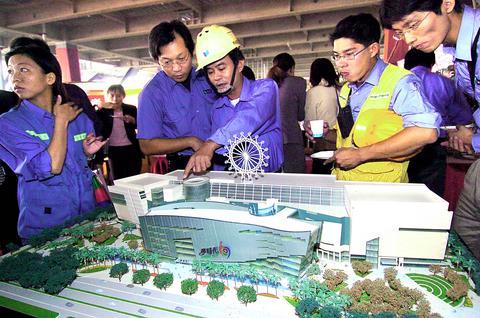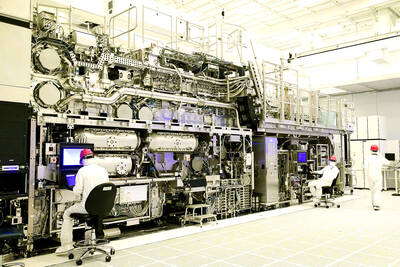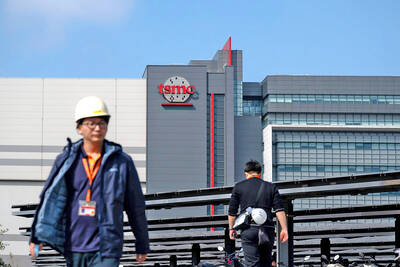The bigger, the better. That's the basic spirit behind the Uni-President Group's (
Kao made the remarks during a topping-off ceremony for the 121,000-ping (400,000m2) Dream Mall (

PHOTO: CHANG CHUNG-YI, TAIPEI TIMES
The mall, which is located next to Kaohsiung Harbor and within a 10-minute drive from the city's downtown, expects to divert shoppers from the city's smaller retailers, including Hanshin Department Store (漢神百貨), Shin Kong Mitsukoshi Department Store (新光三越) and the FE21 Mega shopping center (高雄大遠百), Kao said.
"We have no rivals here [in Kaohsiung] because no one can compare with us in terms of size," said Kao, whose group owns the nation's largest food conglomerate, Uni-President Enterprises Corp (統一企業).
"We will make it a landmark in Kaohsiung and a must-see for foreign tourists," Kao said.
The NT$30 billion (US$930 million) mall will be twice the size of the ball-shaped Core Pacific City Mall (
Rising nine stories with three basement levels, the mall will feature a small rooftop Ferris wheel, as well as department stores, hypermarkets, theme parks, gyms, a Cinemark cinema (喜滿客) and an Eslite Bookstore to offer a wide array of services, said Yeh Chih-chung (葉致中), president of the Tung Li Development Co Ltd (統立開發), which is in charge of the mall's management and operation.
With 63 percent of the mall's available space already contracted out to tenants, Yeh said they are also in talks with international brands, including LV and Gucci, to strengthen the product mix.
The mall aims to attract 12 million people a year and achieve NT$14.4 billion in first-year sales, he said.
After the mall begins operation, the company will focus on building the second phase of the project, a five-star hotel on a 8,000-ping piece of land next to the shopping center, Yeh said.
As a novice in the shopping sector, the group has cooperated with Japan's Diamond City Co Ltd to benefit from its retail know-how.
"If the mall operates well, we will duplicate the model northward to Tainan, Taichung and then Taipei," Kao said.

ASML Holding NV’s new advanced chip machines have a daunting price tag, said Taiwan Semiconductor Manufacturing Co (TSMC, 台積電), one of the Dutch company’s biggest clients. “The cost is very high,” TSMC senior vice president Kevin Zhang (張曉強) said at a technology symposium in Amsterdam on Tuesday, referring to ASML’s latest system known as high-NA extreme ultraviolet (EUV). “I like the high-NA EUV’s capability, but I don’t like the sticker price,” Zhang said. ASML’s new chip machine can imprint semiconductors with lines that are just 8 nanometers thick — 1.7 times smaller than the previous generation. The machines cost 350 million euros (US$378 million)

Apple Inc has closed in on an agreement with OpenAI to use the start-up’s technology on the iPhone, part of a broader push to bring artificial intelligence (AI) features to its devices, people familiar with the matter said. The two sides have been finalizing terms for a pact to use ChatGPT features in Apple’s iOS 18, the next iPhone operating system, said the people, who asked not to be identified because the situation is private. Apple also has held talks with Alphabet Inc’s Google about licensing its Gemini chatbot. Those discussions have not led to an agreement, but are ongoing. An OpenAI

INSATIABLE: Almost all AI innovators are working with the chipmaker to address the rapidly growing AI-related demand for energy-efficient computing power, the CEO said Taiwan Semiconductor Manufacturing Co (TSMC, 台積電) yesterday reported about 60 percent annual growth in revenue for last month, benefiting from rapidly growing demand for artificial intelligence (AI) and high-performance computing applications. Revenue last month expanded to NT$236.02 billion (US$7.28 billion), compared with NT$147.9 billion in April last year, the second-highest level in company history, TSMC said in a statement. On a monthly basis, revenue surged 20.9 percent, from NT$195.21 billion in March. As AI-related applications continue to show strong growth, TSMC expects revenue to expand about 27.6 percent year-on-year during the current quarter to between US$19.6 billion and US$20.4 billion. That would

‘FULL SUPPORT’: Kumamoto Governor Takashi Kimura said he hopes more companies would settle in the prefecture to create an area similar to Taiwan’s Hsinchu Science Park The newly elected governor of Japan’s Kumamoto Prefecture said he is ready to ensure wide-ranging support to woo Taiwan Semiconductor Manufacturing Co (TSMC, 台積電) to build its third Japanese chip factory there. Concerns of groundwater shortages when TSMC’s two plants begin operations in the prefecture’s Kikuyo have spurred discussions about the possibility of tapping unused dam water, Kumamoto Governor Takashi Kimura said in an interview on Saturday. While Kimura said talks about a third plant have yet to occur, Bloomberg had reported TSMC is already considering its third Japanese fab — also in Kumamoto — which would make more advanced chips. “We are